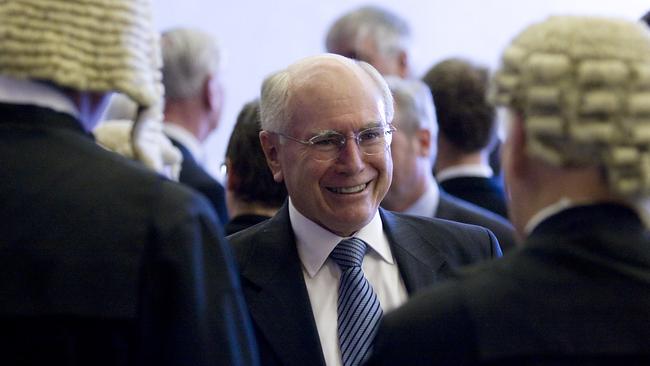John Howard urges caution on reform of ASPI think tank
John Howard has urged the government not to implement any changes that would threaten the independence of the Australian Strategic Policy Institute.

Former Liberal prime minister John Howard has urged the government not to implement any changes that would threaten the independence of the Australian Strategic Policy Institute, following a review recommending funding for its Washington office be cut and a government “observer” be put on its board.
The intervention by the elder statesman – who was in the top job when ASPI was formed in 2001 – comes after Mr Howard’s deputy at the time, John Anderson, threatened to quit the ASPI council over the reforms recommended by former Department of Foreign Affairs and Trade secretary Peter Varghese.
‘The whole purpose of establishing ASPI was to provide an alternative independent source of national security advice to the government,” Mr Howard told The Weekend Australian. “If the implementation of any of these recommendations threatens that, then I am against it.”
The Albanese government agreed to most recommendations in the review, released on Thursday, but faced outcry from the Coalition and the strategic policy sector.
ASPI and the opposition both raised alarm with the necessity of the think tank’s Washington office during the upcoming Trump administration, given its ties with the former Trump government and the challenges already emerging between the US and Australia on issues such as tariffs and social media.
However, Mr Varghese defended his review, writing in The Weekend Australian that he “had hoped for a sense of perspective” from think tanks and politicians.
“The sky has not fallen, ASPI will continue to do what it does, independent thinking will remain in the control of the thinker and how well ASPI fares in the competition for funds will depend entirely on how well it does its job,” he writes.
“It has done big things before and I am sure it will do so again.”
Mr Varghese also hit back at comments by former ASPI executive director Peter Jennings, who said such interventionary reforms would not be allowed in other publicly funded sectors, such as universities.
“As for Peter Jennings’ rather tortuous analogy of how I would feel if my university were to be subject to the requirements I have recommended for think tanks, Peter obviously has little idea of the raft of government-imposed compliance and regulatory obligations universities face,” he said. “I think taxpayers might think the idea that ASPI is entitled to indefinite funding, irrespective of performance, a bit presumptuous.”
The Varghese review sparked alarm that the reforms were being agreed to in an effort to placate China, which has raised issue on numerous occasions over the hawkish commentary of think tanks such as ASPI.
“As for the suggestion that my recommendations were influenced by China’s dislike of ASPI, my report makes it clear that this had no bearing on my conclusions,” he said.
“I explicitly state that the idea that a think tank should be shut down because the government does not like its views is a dangerous one and contrary to the value of policy contestability in a liberal democracy.”




To join the conversation, please log in. Don't have an account? Register
Join the conversation, you are commenting as Logout